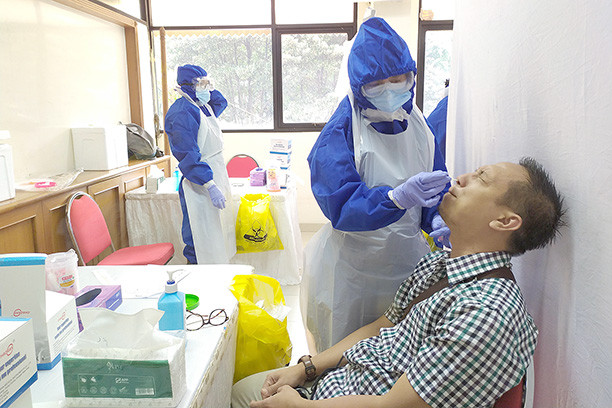Popular Reads
Top Results
Can't find what you're looking for?
View all search resultsPopular Reads
Top Results
Can't find what you're looking for?
View all search resultsAdaptation key to meeting the many demands of new COVID-19 normal
Health services, too, should be modified and strengthened, not only to treat COVID-19, but to also address the many indirect health impacts the virus is having, quite apart from its adverse effect on the provision of essential health services, which WHO is vigorously supporting member states to minimize.
Change text size
Gift Premium Articles
to Anyone
C
OVID-19 is a direct threat to the health and well-being of all people in the WHO South-East Asia Region. For as long as the virus spreads, the health and well-being of the region's near 2 billion people will be at risk, whatever the transmission scenario. WHO and its member states in the region must continue to dig deep and aggressively minimize transmission, responding to every case, cluster and evidence of community transmission.
But to complement such measures, we must also adapt our cities and surroundings, especially as public health and social interventions – including physical distancing – are relaxed or reapplied based on local epidemiological evidence. The need of the hour is for us all to think innovatively, and to retool our environments to meet the many demands of our new COVID-19 normal.
For example, hand hygiene facilities can be installed at the entrance to public or private commercial buildings, and at all transport locations. Workplaces can stagger hours, increase ventilation and encourage staff to work from home as much as possible. And we can all take personal measures to minimize the risk of bringing an infection home, which is especially important in multi-generational households.
Proactive efforts to protect vulnerable groups, including internal and returning migrants, are especially needed. Challenges associated with inadequate housing and access to water exacerbate the risk of the disease spreading. So too does inadequate community engagement and communication.
Key WHO guidance on protecting and engaging vulnerable groups can help local authorities implement high-impact measures that are equity oriented and which can be integrated into emergency planning ahead of the monsoon and flu seasons.
Health services, too, should be modified and strengthened, not only to treat COVID-19, but to also address the many indirect health impacts the virus is having, quite apart from its adverse effect on the provision of essential health services, which WHO is vigorously supporting member states to minimize.
Take mental health. The uncertainty the pandemic is causing, in addition to the fear of contracting the disease, has increased the prevalence of mental health issues, which may be exacerbated by substance use or difficulties accessing mental health services and psychiatric medicines.
To help all people access the mental health care they need, health leaders can invest in appropriate services and ensure existing mental health services continue to function. Psychiatric care can be provided over the phone or online. Community support groups can continue to meet in person or virtually while observing physical distancing guidance. Health facility administrators can ensure all health workers know where and how to access the care they need to stay mentally well and resilient.
Services for intimate partner violence require similar attention. COVID-19 has increased stress, disrupted social and protective networks and decreased access to services, all of which can exacerbate the risk of intimate partner violence. With families spending more time at home, the likelihood that a woman in an abusive relationship will be exposed to violence has dramatically increased.
To help provide the necessary care, health facilities can identify and offer information on locally available support services such as hotlines, shelters and counselling services. Health workers themselves can make a difference, for example by listening empathetically and without judgement, in addition to providing appropriate medical treatment. The use of mHealth and telemedicine to safely address violence against women must be urgently explored.
Nutrition remains a core concern. Across the region, broken supply chains and loss of livelihoods and incomes have the potential to severely impede access to healthy diets rich in whole grains, fruit and vegetables. School closures have resulted in many children missing out on school meals. Disruptions to nutrition services – especially those supporting maternal and child health and nutrition – could impact millions of vulnerable people in ways both chronic and acute.
It is the duty of all stakeholders in the region to protect the nutritional status of the most vulnerable and to strengthen the health services and programs on which they rely. Stakeholders can adapt existing nutritional services, for example by providing digital counselling or additional take-home supplies. They can also streamline referral pathways for nutritional services and expand nutrition-sensitive social protection and community programs.
Given the region’s rich tradition of innovation and adaptation, we have immense potential to re-tool our cities, surroundings and services to meet the many demands of our new COVID-19 normal. There is not a moment to lose.
WHO and its member states in the region will continue to strategically respond to the pandemic, fully committed to controlling and suppressing spread, strengthening and maintaining health services, and empowering individuals and communities to stay safe, healthy and well. Our battle continues, as it must.










